
Gajendra Jangrid
Cars24, which was founded in 2015, achieved unicorn status and saw its valuation soar to $1 billion by 2020. The company witnessed a huge surge in its revenue during the pandemic, due to a boost in the used-car market, as people tried to avoid public transport. In a freewheeling chat with DH’s Gyanendra Keshri, Cars24’s co-founder Gajendra Jangid dwelled on the company’s future growth strategy and initial public offering (IPO) plans. He also talked about funding issues and other challenges in India’s startup ecosystem.
Edited excerpts:
There have been talks about the Cars24 IPO for quite some time. What is the progress?
This is something which is on the cards. We are working on it. There are a lot of things that we still need to do to get to that level. Our parent entity is based out of Singapore. We plan to list ourselves in India. There are certain procedures that we need to follow in order to get ourselves listed here.
Is there any timeline by which you target to come out with the IPO?
Ideally, I would not like to give a timeline. Once I give a timeline I want to make sure that it’s something that is thought through. It’s going to happen soon, but there is no timeline decided.
What is the plan for expansion of Cars24?
We have completed nine years. During this period we gained market leadership in selling and buying used cars. Now you will see version two of Cars24, where our focus will be to be in a dominant position in anything to do with auto in the organised space. Not only in buying and selling cars but also in the areas like repair, service, challan and FasTag, etc.
How much funds has Cars24 raised and any plan for more in the near future?
Since the beginning we have raised over $900 million. There are around ten major investors including DST Global, Falcon Edge Capital and Alpha Wave. We are not planning to raise new funds. We have got plenty of runaways. Even if we are not profitable, our cash burn is very low and there is no requirement as such to raise any funds to support any other activities that we are doing.
How do you see the funding environment? Is it getting challenging for start-ups to raise funds?
That’s true for the global economy. It’s not just about the start-ups ecosystem. As and when the things improve for the overall economy it will improve for the start-ups also.
You set up the business around 10 years back. What changes have you seen in the startup ecosystem in this past decade?
The ecosystem has evolved. A lot of good things have happened. The government is promoting start-ups. There are private initiatives like Shark Tank that provide a platform to promote and support start-ups. A lot of seniors are coaching and mentoring the junior folks. Start-ups have very good potential. In the next decade or so you will see a lot of start-ups that originated out of India becoming global names. I am confident that India will produce its own firms that will be global brands like Google and Facebook.
Some of the poster-boys of the Indian start-up scene, such as Byju’s and Paytm are in trouble. Do you see such developments impacting the overall startup ecosystem?
They are in trouble for different reasons. The bottom line is, we need to focus on our own business and do the things right. We need to gain the confidence of not only the customers but investors also. In order to do this you need to follow the right guidelines, get yourself audited by reputed agencies and be compliant. If we do these things right I am not much worried about what has happened to someone else.
Don’t you think start-ups burning money is not sustainable and it is leading to troubles?
Most of the start-ups are burning money. It’s not just those two (Byju’s and Paytm). It’s about following the right strategy, sticking to it, investing where you should be investing in and clearly showing the right trajectory to investors. I am not worried about a short spike, up or down. I am optimistic about the long-term.